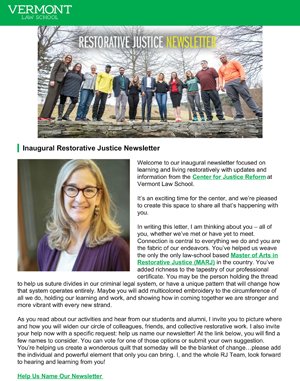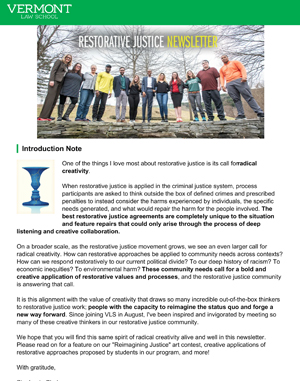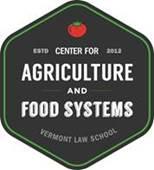FoodTank, a global think tank focused on building a “community for safe, healthy, nourished eaters,” recently named the Center for Agriculture and Food Systems (CAFS) at Vermont Law School one of “118 Organizations to Watch in 2018.” This marks the second year CAFS made the FoodTank list, which recognizes organizations for their work toward a more sustainable food system and CAFS specifically for its dual mission to train food and agriculture advocates and entrepreneurs and to create innovative legal tools that support the food movement.
“We appreciate FoodTank’s recognition of our work and commitment to promoting access to healthy food, building health equity in communities, and improving environmental quality,” said CAFS Director Laurie Ristino. “Special thanks to our faculty and staff, who do a wonderful job leading our various projects and supporting our students as they develop as leaders in the food movement, and to our many project partners who make our work possible.”
Recent CAFS projects include the Healthy Food Policy Project, Blueprint for a National Food Strategy, National Gleaning Project, Farmers Market Legal Toolkit, Farmland Access Legal Project, and Farm Animal Welfare Certification Guide.
CAFS is housed within the Environmental Law Center at VLS, which offers the nation’s top-ranked environmental law program. The CAFS team provides an expanding curriculum in food and agriculture for law and policy students, and training and legal tools to help build sustainable local, regional and national food systems. For more information about CAFS, visit vermontlaw.edu/cafs or email cafs@vermontlaw.edu.
###
Vermont Law School, a private, independent institution, is home to the nation’s largest and deepest environmental law program. VLS offers a juris doctor curriculum that emphasizes public service; four master’s degrees—Master of Environmental Law and Policy, Master of Energy Regulation and Law, Master of Food and Agriculture Law and Policy, and Master of Arts in Restorative Justice; and four post-JD degrees —LLM in American Legal Studies (for foreign-trained lawyers), LLM in Energy Law, LLM in Environmental Law, and LLM in Food and Agriculture Law. The school features innovative experiential programs and is home to the Environmental Law Center, South Royalton Legal Clinic, Environmental and Natural Resources Law Clinic, Energy Clinic, Food and Agriculture Clinic, Center for Applied Human Rights, and Center for Justice Reform. For more information, visit vermontlaw.edu, find us on Facebook, and follow us on Twitter and Instagram.



















